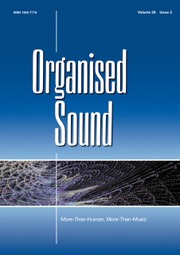Article contents
Live Coding Poetry: The narrative of code in a hybrid musical/poetic context
Published online by Cambridge University Press: 14 August 2023
Abstract
Live coding is a celebrated practice that is used in many areas, combined with a variety of artistic fields. Code poetry is a form of poetry with many variations, all of which have a common rule: the code that is or produces the poem must compile without errors. The meeting point of live coding and code poetry seems to have not yet been thoroughly explored, leaving space for experimentation and research. Certain attempts have already been made, where live coding is either approached through natural language or used to break up and merge chunks of existing poems, forming new ones. Computer code has also been used to write deterministic opera librettos, following the code poetry paradigm. This article focuses on the literary and artistic attributes of code, on code poetry and on the existing attempts to combine it with live coding. It also highlights the narrative attribute of musical live coding to formulate a rationale for combining live coding with code poetry in a musical context. The goal is to examine the possibilities of this combination, as well as how this can be achieved, from a technical point of view.
Information
- Type
- Article
- Information
- Copyright
- © The Author(s), 2023. Published by Cambridge University Press
References
REFERENCES
VIDEOGRAPHY
- 1
- Cited by


